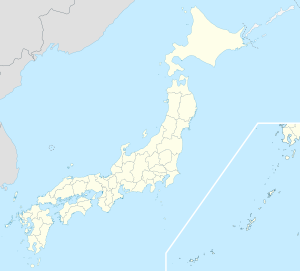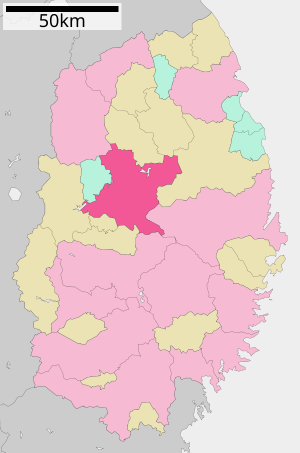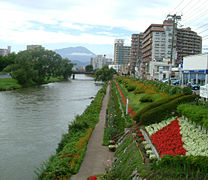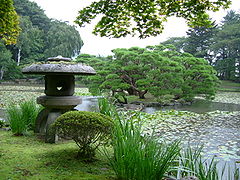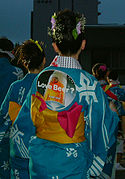Morioka
| Morioka-shi 盛 岡市 |
||
|---|---|---|
| Geographical location in Japan | ||
|
|
||
| Region : | Tōhoku | |
| Prefecture : | Iwate | |
| Coordinates : | 39 ° 42 ' N , 141 ° 9' E | |
| Basic data | ||
| Surface: | 886.47 km² | |
| Residents : | ||
| Community key : | 03201-8 | |
| Symbols | ||
| Flag / coat of arms: | ||
| Tree : | Japanese cake tree | |
| Flower : | Iris laevigata | |
| Bird : | stilt | |
| town hall | ||
| Address : |
Morioka City Hall 12 - 2 , Uchimaru Morioka -shi , Iwate 020-8530 |
|
| Website URL: | http://www.city.morioka.iwate.jp/ | |
| Location of Moriokas in Iwate Prefecture | ||
Morioka ( Japanese 盛 岡 市 , - shi ) is a city and the administrative seat of the Japanese prefecture of Iwate , the largest of the six prefectures in the Tōhoku region .
geography
Morioka stands in the shadow of the 2,041 meter high Iwate Mountain . The 1993 Alpine World Ski Championships took place in the Shizukuishi ski station near Morioka . Near the mountain is Tazawa Lake (425 m deep, 2570 ha). The Kitakami flows through the city from north to south.
history
The city was founded in 1597. Morioka has been the capital of Iwate Prefecture since 1889.
Attractions
One of the sights of the city of Morioka is the stone-splitting cherry tree, a tree that grows from the crack in a granite block and bursts it as it grew. This cherry tree is about three hundred to four hundred years old and stands in front of the courthouse. In 1923 the tree was declared a national treasure.
In the Hoon-ji , which was probably built in 1732, there are 500 lacquered Buddhist statues made of wood ( rakan ). What is special about these figures is that there are also sculptures by Marco Polo and Kublai Khan among them .
Iwate's bench is an example of the Meiji era with its red brick and white granite facade . It was built in 1911 and is located in the city center.
The castle Morioka was founded in 1597 by daimyo Nambu Nobunao begun and completed in 1633, which over the fief Morioka - han prevailed. It was destroyed during the Meiji Restoration . Today only the foundation walls of the castle remain. Iwate Park with the monument to the poet Ishikawa Takuboku (1886–1912) is also located there today .
Next to the birthplace of Hara Takashi , the first civil prime minister of Japan (1918–1921), there is a memorial with documents on the country's recent history and items from the property of the politician who died in 1921.
The Hashimoto Museum exhibits works by the painter Hashimoto Yaoji (1903–1979) as well as ceramics and metal art.
The 1993 Alpine World Ski Championships took place in the Shizukuishi winter sports station near Morioka .
Morioka is best known for its hardware, Nambu tetsubin . Morioka is also known in Japan for its turned wooden dolls ( kokeshi ) and for the ceramics made from kuji ( kuji-yaki ).
Festivals
On June 15th, the Chagu-Chagu Umakko celebrates the end of rice sowing with a colorful horse parade through Morioka to the Hachiman-gu . Every year, from 5 to 7 September, the festival is Hanamaki- matsuri celebrated the culmination of the "dance of the deer" ( Shika-odori is). The Hachman-gu Festival takes place in Morioka every year from 14 to 16 September, with a parade of portable shrines and colorful floats at the center.
Picture gallery
Universities and colleges
Town twinning
sons and daughters of the town
- Inazo Nitobe (1862–1933), scholar and secretary of the League of Nations
- Yonai Mitsumasa (1880–1948), admiral and politician, 37th Prime Minister of Japan
- Takuboku Ishikawa (1886–1912), poet
- Katsura Funakoshi (* 1951), sculptor and graphic artist
- Mitsuru Nasuno (* 1963), musician
- Mitsuo Ogasawara (* 1979), football player
- Keita Fujimura (* 1993), soccer player
- Kaito Kubo (* 1993), soccer player
- Ichirō Suzuki (* 1995), football player
- Ken'ichi Tanimura (* 1995), football player

